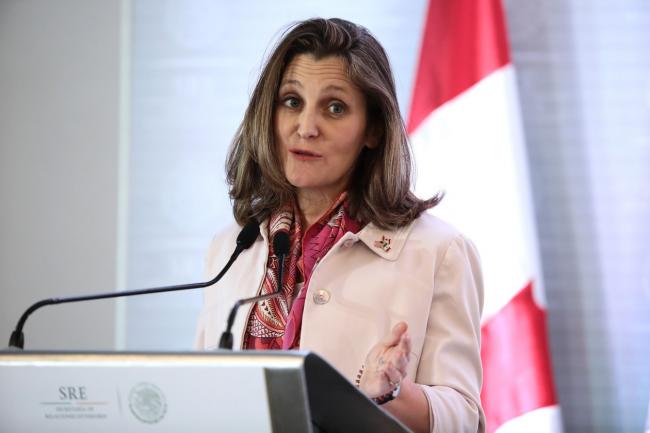Articles Menu

May 10, 2022
OTTAWA, Ont. — Trudeau Cabinet ministers recently approved a special C$10 billion loan guarantee to entice investment in the government-owned Trans Mountain pipeline expansion project.
Finance Minister Chrystia Freeland announced a freeze on public funding for the TMX project in February. On April 29, Cabinet approved the new transaction, administered under the Canada Account at Export Development Canada, to protect creditors.
The department of finance says the loan guarantee does not signal a change in course.
“The government will spend no additional public money on the Trans Mountain Expansion Project,” finance department spokesperson Anna Arneson told POLITICO about the guarantee.
Pipelines have become easy targets in Canada, a major oil-producing country with net-zero ambitions. The government’s ownership of Trans Mountain and its continued financing of projects risks coming off to the public as at odds with its climate ambitions.
EDC is a federal crown corporation mandated to support domestic businesses. Its loan guarantee service aims to increase the total borrowing capacity of a business by up to C$10 million by splitting the risks with financial institutions.
Canada Account transactions are only approved in extraordinary circumstances.
— Why it’s special: EDC logs loan guarantee transactions under C$10 million in its own books. It administers the Canada Account, but keeps those transactions separate since political sign-off is required on endeavors that would otherwise be deemed too risky for EDC.
Cabinet’s approval comes more than two months after Freeland announced a halt to future public spending on the project to temper costs which have ballooned to C$21.4 billion this year from C$12.6 billion.
Construction is half complete on the project to twin the 715-mile pipeline from the Edmonton area in Alberta to Burnaby, British Columbia. The project will increase Trans Mountain’s pipeline capacity to 890,000 barrels a day from 300,000, with hopes of expanding Canadian petroleum products sales in the Asia-Pacific market.
— Rules for override: Under law, International Trade, Export Promotion, Small Business and Economic Development Minister Mary Ng, with agreement from Freeland, can decide if a proposed Canada Account transaction is in Canada’s national interest.
Cabinet approval is required for proposed transactions that exceed C$50 million “or those of a sensitive nature.”
— Politicized energy debate: Trans Mountain has been a thorny issue for the Liberals since Trudeau’s government bought the pipeline expansion project in 2018 for C$4.5 billion. Ottawa bought the pipeline from Texas-based Kinder Morgan to ensure its construction after the pipeline company began waffling on its commitment to build the expansion, citing political uncertainty.
Design changes and the impact of widespread flooding in B.C. late last year caused a three-month construction delay, which increased financing costs and the project’s overall budget, according to the Trans Mountain, a federal crown corporation.
The longer the expansion takes to complete, the more the Trudeau government’s environmental credibility risks being shredded ahead of the next scheduled election in 2025.
Russia’s war in Ukraine has fueled momentum in developed economies to wean off Russian oil and gas and take a more serious look at renewables and fossil fuel subsidies.
— Define subsidy: Trudeau’s Liberals are under pressure to make good on their election promise to eliminate fossil fuel subsidies by 2023 — an ambitious timeline considering departments are still trying to figure out what is and isn’t a fossil fuel subsidy.
Éric Pineault, a professor and president of the Institute of Environmental Sciences at the Université du Québec à Montréal, told committee members in April he considers the Trans Mountain project an industry subsidy.
A loan guarantee for the pipeline is a policy decision “about an economic intervention the government can make” to protect creditors, he said. “It’s, therefore, a subsidy in the form of protection against the credit risk.”
Despite Liberals pledging in the 2019 budget to produce a self-report of federal fossil fuels subsidies inclusive of “any potential plans to reform subsidies,” there remains no official criteria or definition for what is considered an “inefficient” fossil fuel subsidy in Canada.
Environment and finance department officials told the House committee last week that work on an official definition is ongoing — without the explicit involvement of EDC.
“EDC is not scoped into that work because what they do does not meet the definition of subsidy,” Environment and Climate Change Canada Assistant Deputy Minister Hilary Geller told MPs on May 5.
The government’s self-reported list of federal fossil fuel subsidies is expected to be finished in summer 2023.
[Top photo: Finance Minister Chrystia Freeland announced a freeze on public funding for the TMX project in February. | Hector Vivas/Getty Images]